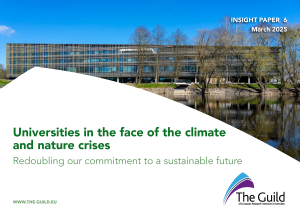Breton et al. (2025) Universities in the face of the climate and nature crises: Redoubling our commitment to a sustainable future

Breton et al. (2025). Universities in the face of the climate and nature crises: Redoubling our commitment to a sustainable future. The Guild Insight Paper No. 6, The Guild of European Research-Intensive Universities and Bern Open Publishing. 49p. – https://doi.org/10.48620/86536 – open access document pdf – CC BY 4.0 V tem dokumentu je izražena zaveza […]